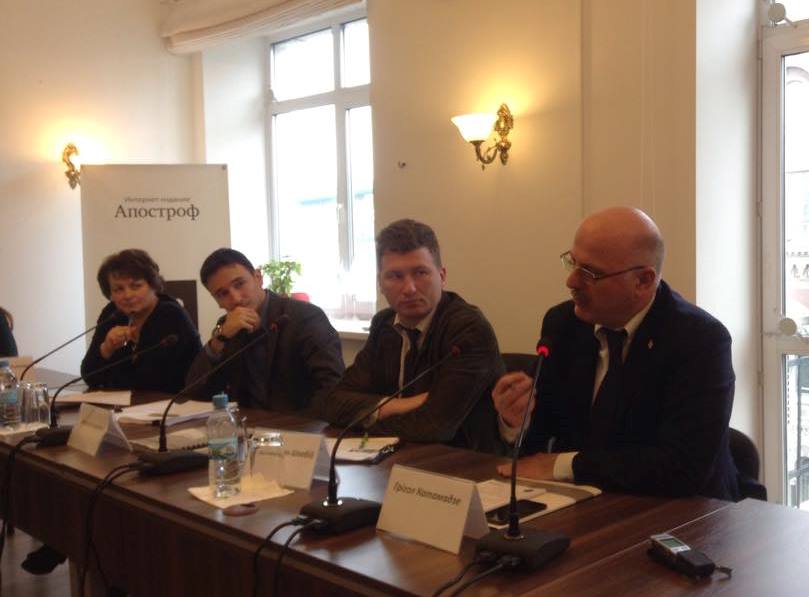
Reforming Ukraine’s tax system: a long, muddy road to overcome corruption?
Experts, state and business representatives met today in Kiev to discuss the country’s progress in reforming its dysfunctional tax system
 Hromadske Radio
Hromadske RadioIn particular, the State Fiscal Service (SFS) attracted much criticism.
The main reform of Ukraine’s tax system today is a new law waiting to be voted for by the Ukrainian parliament, whose aim is to tackle corruption within the SFS. Nevertheless, all participants of the panel discussion agreed that this law is far from being perfect and must be modified by MPs.
Angela Bochi, a fiscal expert at the Kiev-based International Center for Perspective Studies, pointed out that there has been no decrease in the amount of civil servants working at the SFS.
“At 49 000, Ukraine clearly has too many tax inspectors,” she declared. She added that Georgia, often cited as a model for Ukraine in terms of tax reform, employs only 3200 tax inspectors: even taken into account Georgia’s population, Ukraine still proportionally employs nearly twice as many tax inspectors.
Economist Kostiantyn Shvabiy underlined the need to consult the SFS reform with business representatives and to integrate Ukraine’s tax service with its customs office.
“Also, we must pass from an organ whose purpose is to punish businessmen to an organ whose purpose is to serve them,” added Mr. Shvabiy. “Reforming the SFS should be the fundament of our fiscal reform.”

Grigol Katamadze, president of Taxpayers Association of Ukraine and former ambassador of Georgia to Ukraine, reminded that passing innovative laws is not enough:
“We often hear in Ukraine that one should look at the Georgian example (…) but the tax reform I remember was not just one law, it was constant reform over the past ten years (…) one cannot just pass a law and consider that all problems have been solved,” he claimed.
He went on to add that he often meets Ukrainian businessmen in various parts of the country, who complain to him about widespread corruption in the SFS:
“We cannot continue with the system we have nowadays, where a tax inspector can, say, choose to afflict either a fine of 1 000 hryvna or one 10 000 hryvna with no need to justify his choice, because this leads to corruption. Because the SFS sees its mission in punishing businessmen, what we have now is lawlessness in regards to business,” he added.
Larysa Vrublevska, auditor at the EUCON International Legal Centre disagreed with this stance. She claimed that the SFS, by its nature, needs to serve a punishing purpose:
“What we have is a sort of vicious circle: the SFS is corrupt because it can freely fine businessmen, but controlling tax incomes and inflicting fines is the essence of its job,” she added.

A possible solution, in her opinion, is transferring part of the organ’s competences to Ukraine’s Ministry of Finance, though she admitted this would necessarily not solve all problems.
In an exclusive commentary to Hromadske radio, Grigol Katamadze expressed his belief in full liberalization of Ukraine’s tax system:
“Today, unofficial employment is massive because the tax burden on employing someone legally is estimated to be between 52% and 68%. This figure needs to be lowered to 20% (…) Businessmen in Ukraine want to employ people legally, but for now, they simply can’t afford it,” he declared.
In Mr. Katamadze’s opinion, the country’s budget will be able to go through such changes. Moreover, the former Georgian ambassador to Ukraine believes that a temporary fall in budget revenues should be compensated by an increase in revenues from more legal employment.
A possible compromise, progressive evolution towards a lower rate of taxes on employment, is not a solution, as “recent history has shown that prolonging reforms leads to not implementing them,” believes Mr. Katamadze.
According to an audit conducted last month by Ukraine’s Justice Ministry, 42% of Ukraine’s tax inspectors should be sacked, mainly for charges linked to corruption. On October 21, Prime Minister Arsenii Yatseniuk publicly demanded from SFS director Roman Nasirov that he enforce these recommendations.
Mr. Nasirov has partially fulfilled Yatseniuk’s will, most notably by sacking the director of the SFS’s Central Department in Kiev Ludmyla Demchenko.
Karol Łuczka special for Hromadske Radio


